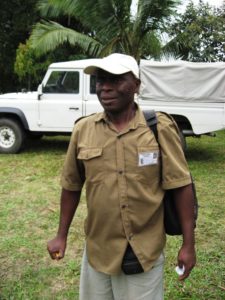Steward of Madagascar’s rainforest continues to protect an oasis for wildlife
The Seacology Prize is awarded just once a year, but the dedicated work of its recipients rarely stops. Years or even decades after being honored, many Seacology Prize recipients–every one an inspiring environmental activist–are still working to defend fragile island habitats and stand up for indigenous communities.

Case in point: Rabary Désiré of Madagascar, who was awarded the prize in 2010. As a guide in Madagascar’s Marojejy National Park and other northeastern forests, Désiré shared his deep knowledge and love of the area with visitors. But he went further. Committing to an austere lifestyle, he saved up the proceeds from his pioneering ecotourism business and started buying small parcels of land, to keep them safe from loggers and poachers.
After acquiring several fragments of threatened wilderness, Désiré combined them to create Antanetiambo, the first privately owned nature reserve of its kind in the area. Antanetiambo—Malagasy for “on the high hill”—is a densely forested patch of land overlooking rice paddies. The critically endangered silky sifaka (a beautiful, ghostly-white lemur), northern bamboo lemurs, and countless other species found nowhere else in the world live among its trees.
More than a decade later, Antanetiambo is thriving. Much of Madagascar’s remaining forest remains under threat from logging, clearing for agriculture, and wildfires. But Désiré continues to protect the oasis he single-handedly created. He’s now expanded the reserve to 35 acres. Its wildlife-tourism business is a continuing success story, and the biodiversity found in the reserve regularly draws scientists, students, and conservation policy leaders. Seacology’s Madagascar Field Representative, Erik Patel, a distinguished lemur biologist, recently took a group of students and prominent lemur experts to Antanetiambo, to study these fascinating primates.
The success of Antanetiambo illustrates the potential of ecotourism to protect island ecosystems. More and more island communities are seeking Seacology support for small-scale, wildlife-based tourism, which benefits both local people and their environments. Ecotourism taps into the inherent value of healthy habitats, generating sustainable income for local people and creating a financial incentive to continue protecting the environment. Rabary Désire’s decades-long commitment to this approach is providing lasting benefits to one of the world’s great biodiversity hotspots.
A group of silky sifaka lemurs, which can be found in Antanetiambo. Photo by Jeff Gibbs.
Désiré guides a group of visitors through the reserve.

